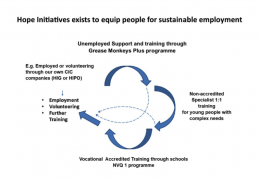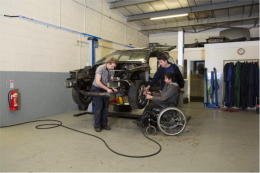 Social Enterprise to uplift the poor
Social Enterprise to uplift the poor
For many months I have been wanting to feature the important topic of Social Enterprise as I see this as one significant way of helping people who are poor or in need. So I was delighted when Nick Priggis responded to my invitation to write a series.
I have known Nick (bio below) for nearly twenty years; he worked with me in the early 2000s to develop the Act Together Initiative which helped the Newfrontiers family of churches bring ministry with the Poor into the heart of church life. Nick’s and Tracey’s passionate hearts for the poor are conspicuous, so it was no surprise to me when empowering the poor became a central part of their church’s agenda when they moved into church leadership in Hope Church, Shrewsbury. Nick is well-placed to write about Social Enterprise; he has a good track-record so writes with real authenticity. Over to Nick:
What is Social Enterprise?
I have been involved in developing Social Enterprises in Shrewsbury for the past 10 years. The Social Enterprise model is part of our local church’s vision in reaching out to our local community and seeking Kingdom transformation locally and (more recently) internationally. But, what is Social Enterprise and what does it mean to be a Christian Social Enterprise?
Social Enterprises seek to engage in social transformation through entrepreneurial and enterprising initiatives. The ‘enterprising’ element is often overlooked or undercooked. When that happens a social enterprise simply becomes a charity by another name. Authentic Social Enterprise is a means by which social transformation takes place through business. But a business, by definition, must make profit, so a viable and profit-making business must be in operation for social transformation to take place.
Christian Social Enterprises are those where disciples of Jesus are committed to seeing the values and integrity associated with His name being expressed within the business they are serving and leading. In addition, the outcomes for that Social Enterprise are those which seek to bring glory to His name and are focused on His coming Kingdom. They are redemptive and restorative values.
Hope Initiatives
For the Social Enterprise I am involved with, Hope Initiatives, the business model we employ is the selling of vocational training to schools, offering routes back into the employment market and delivering contracts for local authority services. We want our training to bring in some funding but we recognise the need to raise funding in other ways. Therefore, we also sell services and products direct to customers through our commercial garage and our second-hand car-parts businesses. Our aims in these businesses are 1) to make profit to reinvest into our training and 2) to provide work experience and employment to those we are seeking to support through the training.
The Social dimension of our work is our commitment to equipping young people with the right foundations for a career in the automotive and manufacturing industries. We do this both by developing their core skills, and by developing character and social skills. We demonstrate our work ethos through our students and participants observing real-time businesses, which run parallel to our training.
 Discipleship
Discipleship
The Christian discipleship aspects of our work are woven into and integrated throughout our organisation:
 They are implicitly expressed in how our team members relate to students, participants and customers.
They are implicitly expressed in how our team members relate to students, participants and customers.- They are demonstrated through our desire for excellence and value for money.
- They are explicitly articulated through weekly prayer meetings, and through the opportunities we have to share the hope we have when asked.
Does this apply to you?
In wondering how you might explore Christian Social Enterprises consider these questions:
- What is my business plan? How might my business make a profit?
- What outcomes from my business are transformative? How might these outcomes positively affect the lives of people?
- How might being a follower of Jesus bring distinction to the way I work in my Social Enterprise?
If you would like more information about our Social Enterprise go to our website or email Nick Priggis.
Next time we will look at how Social Enterprises can be a force for networking by making the connections connect.

Who is Nick Priggis?
Nick is married to Tracey; they have four children. They have lived in Shrewsbury for the last 10 years, having moved there to help serve in a local community church that Nick now helps to lead. Nick is one of the founders of a Social Enterprise which presently includes two community interest companies and is also a Trustee of a charity which supports churches that care for the poor and most vulnerable in the Ukraine and Zambia.
